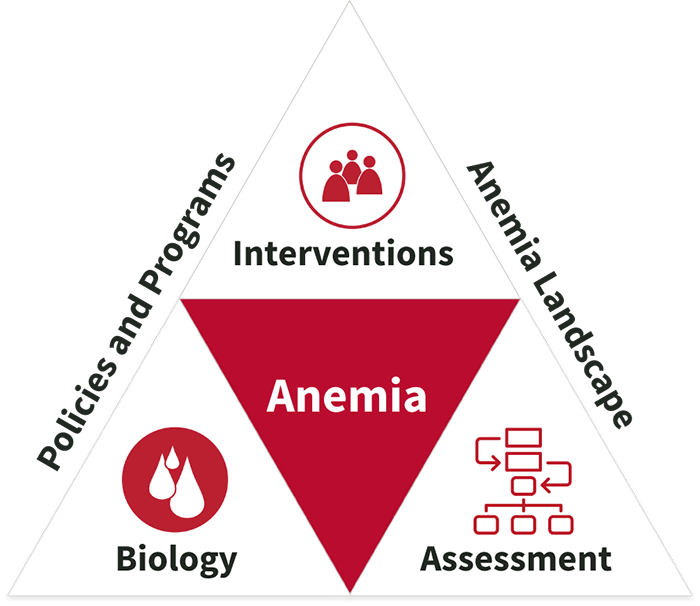Interventions for anemia prevention and control should incorporate an understanding of the biology as well as the assessment of the severity, magnitude, and prevalence of anemia in public health practice. The causes of anemia are multifactorial. Practitioners can address anemia using three main categories of interventions: 1) those that address non-nutritional causes of anemia (e.g., delayed cord clamping, malaria control, deworming); 2) those that address nutrients alone (e.g., dietary diversification, biofortification, food fortification, supplementation with iron and/or other micronutrients); and 3) those that address both. The emphasis of this anemia toolkit will be on interventions of public health relevance, but we also consider the clinical context. In addition to these broad categories, the toolkit will focus on—
- evidence of the impact of inflammation and genetic mutations on the applicability and utility of the interventions, as well as issues related to the bioavailability of nutrients, and considerations of safety when selecting an intervention
- iron and other nutrients like vitamin A, vitamin B12, folate, riboflavin, and zinc that play a role in hemoglobin synthesis and are important for the prevention of anemia such as:
- interventions at different stages of the life course—with a particular focus on women of reproductive age and preschool-age children
- consideration of the interventions within the broader context of the external environments including sustainability, social and cultural factors, and climate change.
In a resource-constrained environment, many health and nutrition issues compete for the attention of public health practitioners and funders. An effective, efficient, and sustainable approach to reducing anemia requires multi-sectoral collaborative efforts where the disparate motivations and mandates of different stakeholders must be addressed. Tools are available to help public health practitioners select one or more interventions to address the multifactorial nature of anemia.
The USAID Advancing Nutrition Anemia Task force has developed five Anemia Briefs that explore current evidence and practice to understand and address the causes and consequences of anemia, and interventions to reduce the burden of disease. One of those briefs—"Food-Based Approaches to Address Anemia”—explore issues related to food-based interventions for reducing anemia.
We found 113 resource(s)



